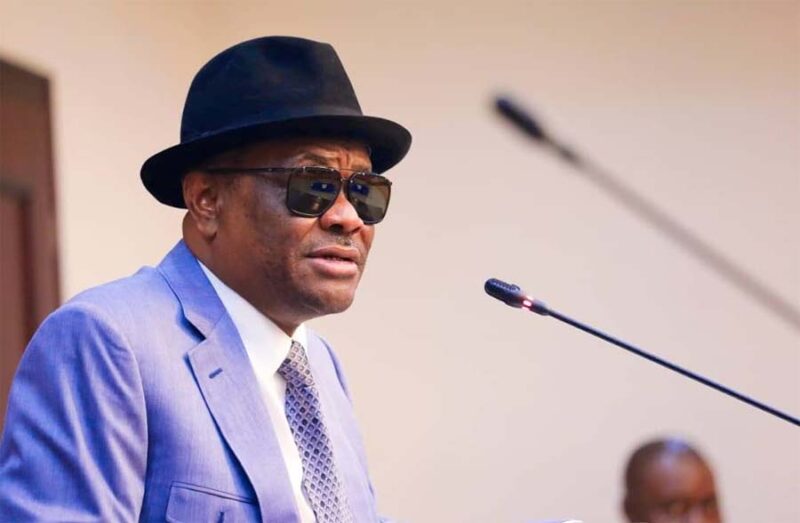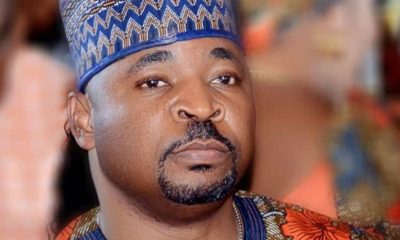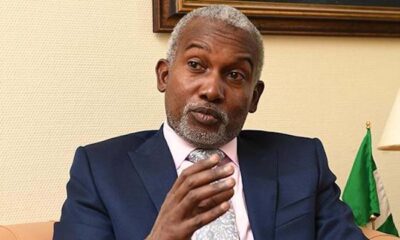News
FG to begin payment of new minimum wage in April

FG to begin payment of new minimum wage in April
The Federal Government on Thursday said a new minimum wage regime would come into effect on April 1, 2024.
The Minister of Information and National Orientation, Idris Mohammed, who disclosed this in an interview in Abuja, said the current N30,000 minimum wage would expire at the end of March 2024.
Mohammed said this on Thursday as an analysis of the 2024 –2026 Fiscal Framework budgets by our correspondents indicated that the Federal Government would spend N24.66tn on salaries in 2024, 2025, and 2026.
Following the removal of the fuel subsidy by President Bola Tinubu on May 29, 2023, the Federal Government agreed to pay N35,000 to each of its workers to cushion the effect of the subsidy removal.
But the organised Labour insisted that the N35,000 wage award was a temporary measure, adding that the minimum wage should be reviewed in 2024.
The Federal Government’s team and the Joint National Public Service Negotiating Council on October 18, 2019, agreed on the implementation of the N30,00 minimum wage after months of negotiations.
However, Labour unions on Thursday confirmed that they had started a negotiation process with the Federal Government, adding that based on the country’s labour law, the minimum wage should be reviewed every five years.
The Nigeria Labour Congress National President, Joe Ajaero, recently said, “It is open knowledge that the review of the national minimum wage is a matter of the law which is expected to happen in 2024.”
On his part, the Minister of Information and National Orientation, Mohammed, told The PUNCH that the improved take-home pay was meant to replace the temporary palliative measure put in place by the government to ameliorate the hardship caused by the fuel subsidy removal.
New wage regime
He said, “Certainly, there is a new wage regime that will come in on April 1, 2024. That is why these palliatives were targeted so they would cushion economic hardship before then. In our negotiation with Labour, we said that the wage issue was not something one could just fix. A committee that will also involve Labour itself will work on it.
“The committee is being constituted and we are talking to Labour about it. And by the time this current wage regime expires by the end of March, we will expect that a new wage will begin by April. It is in this wage regime that we will now have a proper salary structure for workers across the length and breadth of Nigeria. We expect that the private sector and state governors will also do the same.”
A top official of the NLC, in an interview with The PUNCH, said the organised Labour had initiated talks with the government
READ ALSO:
- Sarkin Fulani, 2 others sentenced to life imprisonment
- No former governor is exempted from our investigation – EFCC
- Henry Kissinger, ex-US secretary of state dies at 100
He said, “By April 1, 2024, the current minimum wage will expire. We have all agreed to set up a national wage negotiation committee, and that the committee should comprise all parties.’’
Also, the Head of Information of the NLC, Benson Upah, in an interview with The PUNCH said, “The new minimum wage is to come into effect next year.”
N24.66tn for salaries
As the organised Labour demands a new minimum wage, an analysis of the 2024 –2026 Fiscal Framework shows that the Federal Government intends to spend 29.18 per cent of its total budgets for 2024, 2025, and 2026 on salaries, overheads, and pensions.
The total amount budgeted for these three items amounts to N24.66tn; 29.18 per cent of the N84.50tn budgeted for the three years.
With anticipated salary increases from 2024 amid worsening economic conditions, personnel costs, and the two others are expected to jump by 8.51 per cent from the amount (N7.36tn) budget in 2023 to N7.99tn in 2024.
It is then expected to rise by 2.41 per cent to N8.18tn in 2025, and then by 3.77 per cent to N8.49tn in 2026. The amount pales when compared to the N23.37tn (27.65 per cent of its total budget) the government intends to spend on capital expenditure in the period under review.
This signifies the continuation of a culture of high overheads at the expense of high fiscal deficits. As of the end of September 2023, the Federal Government had devoted 29.76 per cent (N3.78tn) of its total spending (N12.7tn) on salaries.
The amount spent on salaries is 157.14 per cent more than the N1.47tn that has been spent on capital allocations for the year.
The government said, “The actual spending was N12.7tn. Of this amount, N5.79tn was for debt service, and N3.78tn for personnel costs, including pensions.
“Only about N1.47tn (25 per cent of the pro-rata budget) has been released for MDAs’ capital expenditure as of September 2023.”
The Federal Government has about N1.5 million workers and it will review minimum wage by 2024. There are concerns that the government is operating a bloated civil service with many agencies with overlapping functions. This has led to calls for agency mergers and scrapping, where they might apply.
With salaries weighing heavily on its spending, the government, in its 2024 – 2026 fiscal framework, said, “The budget deficit is projected to be N9.18tn in 2024, i.e., N4.6tn down from N11.60tn budgeted in 2023.
“The proposed deficit represents about 50 per cent of total Federal Government’s revenues and 3.88 per cent of the estimated GDP (Gross Domestic Product ). The high projected level of fiscal deficit in 2024 is partly attributable to the proposed salary review of Federal workers across board, increased pension obligations, and higher debt service cost.
READ ALSO:
- Stop luring Muslim students to Pastor Chris Oyakhilome’s programme – MURIC tells Lagos govt
- Cristiano Ronaldo faces $1bn lawsuit over crypto advert
- Lagos shuts RCCG, 7 hotels over noise pollution
“At 3.88 per cent, the projected level of deficit is higher than the three per cent threshold stipulated in the Fiscal Responsibility Act (FRA), 2007, but significantly lower than the 2023 level of 6.11 per cent; FRA 2007, however, allows the government to exceed the 3 per cent threshold if justified by threats to national security.”
The fiscal deficit for the three years under review is expected to total N30.89tn. In June 2023, the World Bank disclosed that the Federal Government’s spending on personnel costs and debt servicing exceeded total revenues in 2022.
According to the Washington-based bank, this was the first time the Federal Government’s personnel costs and debt servicing surpassed its total revenue. It noted that the government is spending a lot on these costs, leaving little room for capital expenditure.
It declared, “Overall, the rigidity of expenditure has increased, squeezing fiscal space for the discretionary spending needed to meet development objectives.
Personnel costs and interest payments comprise a growing share of total general government expenditures (59 per cent in 2022) and for the first time in 2022 exceeded total government revenues (102 percent).”
Rising personnel cost is leaving little room for investments in infrastructure and in his budget presentation speech, President Bola Tinubu disclosed that the government would leverage the private sector to plug its capital expenditure spending holes.
He said, “In view of the limited resources available through the federal budget, we are also exploring Public Private Partnership arrangements to finance critical infrastructure.
“We, therefore, invite the private sector to partner with us to ensure that our fiscal, trade, and monetary policies, as well as our developmental programmes and projects, succeed in unlocking the latent potential of our people and other natural endowments, in line with our national aspirations.”
Recently, the Minister of Budget and National Economic Planning, Abubakar Bagudu, declared that the government was only managing to pay salaries considering its dwindling revenue sources.
The minister represented by the Director (International Cooperation), Dr Sampson Ebimaro at an event said, “Government faces enormous challenge especially now, the government is facing revenue deficit. There’s no money anywhere in the country, the government is just managing to pay salaries.
“The growth rate is very slow, and the population growth is fast pacing and increasing. unemployment is surging amid high inflation. These are issues which non-governmental organisations must take on board in helping the government to cover the space government could not cover.”
FG to begin payment of new minimum wage in April
(PUNCH)
News
‘Enough is enough’, Tinubu directs security chiefs to stop violent attacks

‘Enough is enough’, Tinubu directs security chiefs to stop violent attacks
President Bola Tinubu has ordered security operatives to end forthwith the violent attacks in some parts of the country, especially in Plateau, Borno, and Benue states.
He gave the directive during a meeting with security chiefs at the State House on Wednesday.
The meeting was attended by Nuhu Ribadu, the national security adviser (NSA); Mohammed Mohammed, director-general of the National Intelligence Agency (NIA); Emmanuel Undianeye, chief of defence intelligence; Oluwatosin Ajayi, director-general (DG) of the Department of State Services (DSS); and Femi Gbajabiamila, chief of staff (CoS) to the President.
Speaking with journalists after the meeting, Ribadu said Tinubu declared that “enough is enough” on the resurgence of violence in some parts of the country.
The NSA said the president directed security chiefs to work with the political authorities in states and at the grassroots level to find a lasting solution to the insecurity.
He said the security chiefs had acted on Tinubu’s previous instructions by meeting with political leaders in the affected communities and states.
The NSA said the meeting offered the security chiefs the opportunity to fully brief the president about the current security situation of the country.
“This time, we were able to sit with him for hours and give a proper briefing. We also took new instructions from him,” he said.
“Insecurity is not only a government problem.
“It also involves the subnational units — the communities, local governments, and especially the governors. The president directed that we work more closely with them.
“Some of these problems are community-related. While not entirely so, that element plays a significant role.
“Mr. President is working hard to ensure that Nigeria enjoys peace and stability. We are not relenting. We will not stop until we get the results he demands.”
On the resurgence of violent attacks in Borno, Ribadu said the terrorists were planting explosives during the period of relative peace in the state.
“This enemy does not give up easily. When there’s peace for a long time, they try to shock the public with an isolated incident,” he said.
The NSA said the security situation in the country is not yet at 100 percent, while noting that there is “significant improvement”.
Since the beginning of the month, many have been killed in some communities in Plateau State.
Benue State has also recorded violent attacks as over 50 people were killed in Ukum and Logo LGAs on April 18.
News
Minister queries Julius Berger’s exclusion from furnishing of Abuja Conference Centre

Minister queries Julius Berger’s exclusion from furnishing of Abuja Conference Centre
Minister of the Federal Capital Territory (FCT), Nyesom Wike, has questioned the exclusion of Julius Berger from furnishing the Abuja Conference Centre, despite the company being awarded the full rehabilitation contract in April 2024.
Wike made his position clear during an inspection visit to the project site on Wednesday in Abuja, as reported by the News Agency of Nigeria (NAN).
Last month, the minister announced that the N39 billion renovation was 70–80 percent complete.
He expressed confidence it would be ready for use by May, and among the projects to mark Tinubu’s second year in office.
While commending Julius Berger for the quality of work done so far, Wike said he was shocked to learn that the furnishing aspect of the project was handed over to a different company without his approval.
According to the minister, the original agreement was for Julius Berger to handle the complete rehabilitation of the Abuja International Conference Centre (AICC). He stated that he had personally approved the contract and the budget involved, and any deviation from that plan required official clearance.
“The work was going as expected, the only problem we identified this afternoon has to do with the furniture that will be in the conference hall.
“I was surprised to hear that there is a different contractor for that, which is unacceptable to us. The job was given to Julius Berger entirely. I cannot have different qualities,” Wike stated.
The FCT minister subsequently summoned the leadership of Julius Berger, Abuja Investment Company Ltd (AICL), and the Federal Capital Development Authority (FCDA) to clarify who authorised the deviation from the original contract and on what basis.
He said assigning different contractors to furnish separate sections of the same facility could compromise the overall quality and consistency of the project.
The Abuja International Conference Centre, built by Julius Berger Nigeria Plc in 1990 and completed in time for the 1991 OAU Heads of Government meeting, has long served as a venue for government functions, international summits, exhibitions, and corporate events.
Over the years, the facility deteriorated. In April 2024, President Tinubu ordered urgent renovations after calling its condition an “eyesore” during the ECOWAS Parliament inauguration. The FCT Administration suspended activities on April 8, allowing Julius Berger to begin extensive rehabilitation
News
Kaduna governor revokes land approved sold by El-Rufai

Kaduna governor revokes land approved sold by El-Rufai
Kaduna State Government has revoked institutional houses and plots of land sold in the state by the administration of former Governor Nasir El-Rufai.
Governor Uba Sani on Tuesday ordered the revocation of the properties within Alhuda-huda College, Zaria; Queen Amina College, Kaduna and Government Commercial College, Zaria.
Secretary to the State Government (SSG) Dr. AbdulKadir Mu’azu Meyere, who announced the revocation in a statement, said the decision was taken for overriding public interest and for the common good.
He said efforts were being made to ensure all payments made to the government coffers in respect of the sold houses are refunded.
He said, “In line with its commitment to human capital development and to ensure conducive atmosphere for teaching and learning in schools, the Kaduna State Government, under the leadership of His Excellency, Senator Uba Sani, had revoked all previous sales of institutional houses and land allocations within Alhuda-huda College, Zaria, Queen Amina College, Kaduna and Government Commercial College, Zaria for overriding public interest and for the common good.
“The revocation was approved last year and the revocation order has been conveyed to all allottees, while steps are being taken to refund amounts paid in respect of the sold houses as directed by His Excellency, the Governor of Kaduna State.
“As one of the key pillars of His Excellency’s Human Capital Development, Uba Sani noted that effective learning can best take place in a conducive atmosphere without distractions and sundry interferences.
“The governor has always argued that education is not just a leveler but also a ladder for upward mobility which can transform lives and improve livelihoods.
“To secure the future of our children, the Governor has been expanding access to education in the last two years, by bridging the infrastructural deficit at both primary and secondary schools across Kaduna State.
“In fact, one of the first decisions that His Excellency took upon assuming office was the slashing of the school fees of Kaduna State-own tertiary institutions on August 21, 2023.
“Apart from tertiary institutions, the Senator Uba Sani administration has also improved access by building new primary and secondary schools as well as blocks of classrooms since he became Governor of Kaduna State.
“Indeed, the Sani-led administration has built over 2,336 new classrooms, renovated more than 707 others and provided 3,704 and 30,742 furniture, for teachers and pupils.
“Similarly, Kaduna State Government, has sunk 51 boreholes, provided 918 cubicle toilets for both pupils’ and teachers’ use in all the Local Governments to make learning more conducive.”
-

 International3 days ago
International3 days agoBreaking: Pope Francis dies at 88 – Vatican
-

 metro2 days ago
metro2 days agoBring your children to compete with mine, MC Oluomo challenges those mocking his spoken English
-

 metro1 day ago
metro1 day agoRivers: Tinubu meets with Fubara, may lift his suspension
-

 metro3 days ago
metro3 days agoHow Nigerian hotelier died during wife’s 60th birthday celebration
-

 News2 days ago
News2 days agoTinubu returns to Nigeria after France, UK trip
-

 Business2 days ago
Business2 days agoMarketers count losses as NNPC slashes petrol price
-

 metro2 days ago
metro2 days agoAnsar-Ud-Deen Society of Nigeria elects new leaders, Tinubu praises educational contributions
-

 metro20 hours ago
metro20 hours agoI’m not in supremacy battle with Ooni, says new Alaafin













